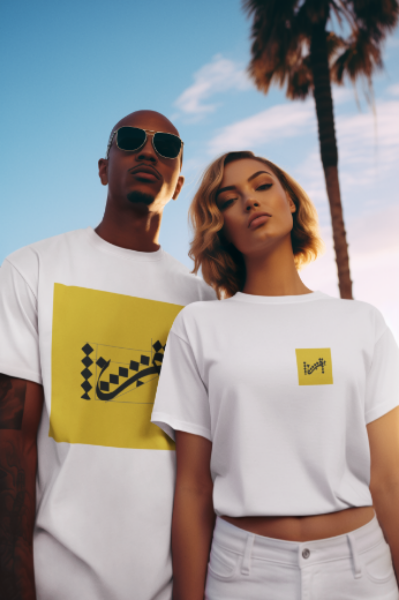Introduction
Arabic calligraphy is an art form that beautifully combines language, culture, and aesthetics. When applied to T-shirt designs, it adds a unique touch that resonates with both tradition and modernity. In this blog post, we’ll explore the process of creating captivating T-shirt designs using Arabic calligraphy.
1. Understanding Arabic Calligraphy
Before diving into the design process, let’s appreciate the rich history of Arabic calligraphy. It has evolved over centuries, with various styles such as Naskh, Diwani, and Thuluth. Each style carries its own beauty and significance. Research different calligraphy styles to find the one that best suits your T-shirt concept.
2. Choosing a Phrase or Word
Select a meaningful Arabic phrase, word, or even a single letter that resonates with your design theme. It could be a powerful quote, a word related to love, peace, or faith, or simply an aesthetically pleasing letterform. Keep cultural context in mind while choosing.
3. Sketching and Composition
Start by sketching your chosen calligraphy on paper. Experiment with different layouts, sizes, and arrangements. Consider how the calligraphy interacts with other design elements (if any). Remember that T-shirt designs need to be visually balanced and readable.
4. Digitalization
Once you’re satisfied with your sketch, digitize it using graphic design software like Adobe Illustrator or CorelDRAW. Pay attention to stroke thickness, curves, and spacing. Clean up any imperfections and ensure smooth lines.
5. Color Palette
Choose a color palette that complements your calligraphy. Traditional colors like black, gold, or deep red work well, but feel free to experiment. Consider the T-shirt color as well—contrast is essential for readability.
6. Placement and Sizing
Decide where the calligraphy will sit on the T-shirt—front, back, or sleeves. Adjust the size accordingly. Remember that simplicity often speaks louder. Sometimes a small, elegant calligraphy detail can make a big impact.
7. Printing Techniques
Explore different printing techniques—screen printing, heat transfer, or direct-to-garment (DTG). Each method has its pros and cons. Screen printing offers durability, while DTG allows intricate details.
8. Material and Comfort
Choose a comfortable T-shirt material that complements your design. Soft cotton or blends work well. Ensure that the calligraphy doesn’t crack or fade after washing.
9. Launch and Promotion
Once your T-shirt is ready, launch it! Promote it through social media, your website, or local events. Share the story behind the calligraphy—it adds depth and connects with your audience.
Conclusion
Arabic calligraphy T-shirt designs are more than just clothing—they carry art, culture, and expression. Whether you’re creating them for personal use or a business venture, embrace the beauty of this ancient art form and let it adorn your T-shirts.
Remember, every stroke of the pen holds a piece of history and a world of meaning.
Feel free to customize this blog post with your own experiences, insights, and images of your T-shirt designs. Happy creating! 🎨👕

